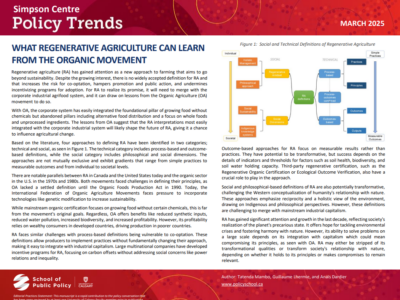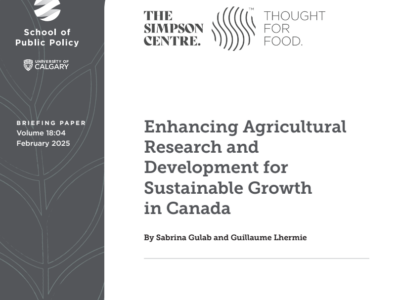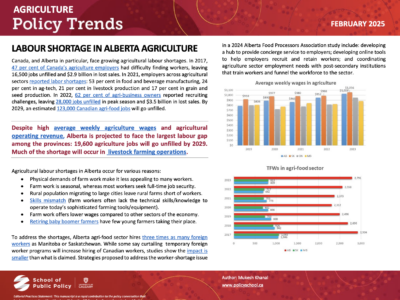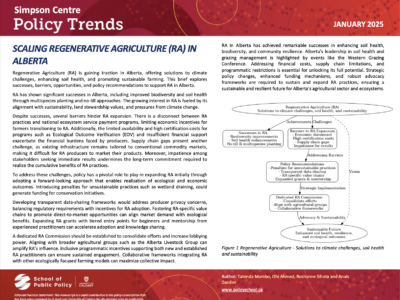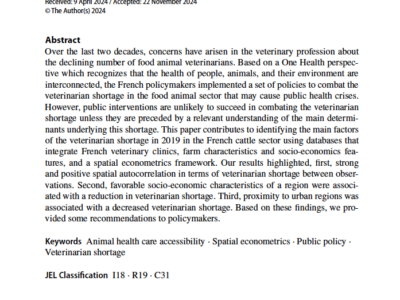Publications
Regenerative agriculture (RA) has gained attention as a new approach to farming that aims to go beyond sustainability. Despite the growing interest, there is no widely accepted definition for RA and that increases the risk for co-optation, hampers promotion and public action, and undermines incentivizing programs for adoption. For RA to realize its promise, it will need to merge with the corporate industrial agrifood system, and it can draw on lessons from the Organic Agriculture (OA) movement to do so.
Wednesday, March 12, 2025
Tatenda Mambo, Guillaume Lhermie, and Anaïs Dardier
The Canadian agriculture and food sector is an essential contributor to the national economy, providing food for domestic consumption and playing a pivotal role in global food security. However, the sector is increasingly challenged by environmental pressures, including carbon emissions, water scarcity and biodiversity loss. In response, Canada aims to promote eco-friendly practices, increase food security, improve productivity and ensure the agriculture sector’s long-term viability and competitiveness. Despite substantial investments in agricultural research and development (R&D), there remains a lack of comprehensive tracking and alignment between public- and private-sector funding. This report provides a detailed analysis of R&D funding trends, identifies key research priorities and makes recommendations to enhance Canada’s agricultural R&D ecosystem for greater sustainability, productivity and competitiveness.
Tuesday, February 11, 2025
Sabrina Gulab and Guillaume Lhermie
Spending on global agricultural research and development (R&D) increased from $31 billion in 2000 to $47 billion in 2016, highlighting the sector’s critical role in addressing food security, climate adaptation and economic competitiveness. While countries like China, Brazil and Australia have made strategic investments that drive innovation and sustainability, Canada’s agricultural R&D spending has declined significantly, falling from $0.86 billion in 2013 to $0.68 billion in 2022. This reduction has left Canada ranking lowest among the top seven OECD countries in agricultural R&D expenditures, jeopardizing its global competitiveness and resilience.
This policy brief looks at global trends, analyzes Canada’s relative under-performance and proposes strategies to revitalize its agricultural R&D framework.
Tuesday, February 11, 2025
Sabrina Gulab and Guillaume Lhermie
Canada, and Alberta in particular, face growing agricultural labour shortages. In 2017, 47 per cent of Canada’s agriculture employers had difficulty finding workers, leaving 16,500 jobs unfilled and $2.9 billion in lost sales. In 2021, employers across agricultural sectors reported labor shortages: 53 per cent in food and beverage manufacturing, 24 per cent in ag-tech, 21 per cent in livestock production and 17 per cent in grain and seed production. In 2022, 62 per cent of agri-business owners reported recruiting challenges, leaving 28,000 jobs unfilled in peak season and $3.5 billion in lost sales. By 2029, an estimated 123,000 Canadian agri-food jobs will go unfilled.
Tuesday, February 04, 2025
Mukesh Khanal
Regenerative Agriculture (RA) is gaining traction in Alberta, offering solutions to climate challenges, enhancing soil health, and promoting sustainable farming. This brief explores successes, barriers, opportunities, and policy recommendations to support RA in Alberta.
Tuesday, January 28, 2025
Tatenda Mambo, Ohi Ahmed, Roshanne Sihota, and Anaïs Dardier
Over the last two decades, concerns have arisen in the veterinary profession about the declining number of food animal veterinarians. Based on a One Health perspective which recognizes that the health of people, animals, and their environment are interconnected, the French policymakers implemented a set of policies to combat the veterinarian shortage in the food animal sector that may cause public health crises. However, public interventions are unlikely to succeed in combating the veterinarian shortage unless they are preceded by a relevant understanding of the main determinants underlying this shortage. This paper contributes to identifying the main factors of the veterinarian shortage in 2019 in the French cattle sector using databases that integrate French veterinary clinics, farm characteristics and socio-economics features, and a spatial econometrics framework. Our results highlighted, first, strong and positive spatial autocorrelation in terms of veterinarian shortage between observations. Second, favorable socio-economic characteristics of a region were associated with a reduction in veterinarian shortage. Third, proximity to urban regions was associated with a decreased veterinarian shortage. Based on these findings, we provided some recommendations to policymakers.
Friday, December 13, 2024
Mehdi Berrada, Didier Raboisson, Guillaume Lhermie
